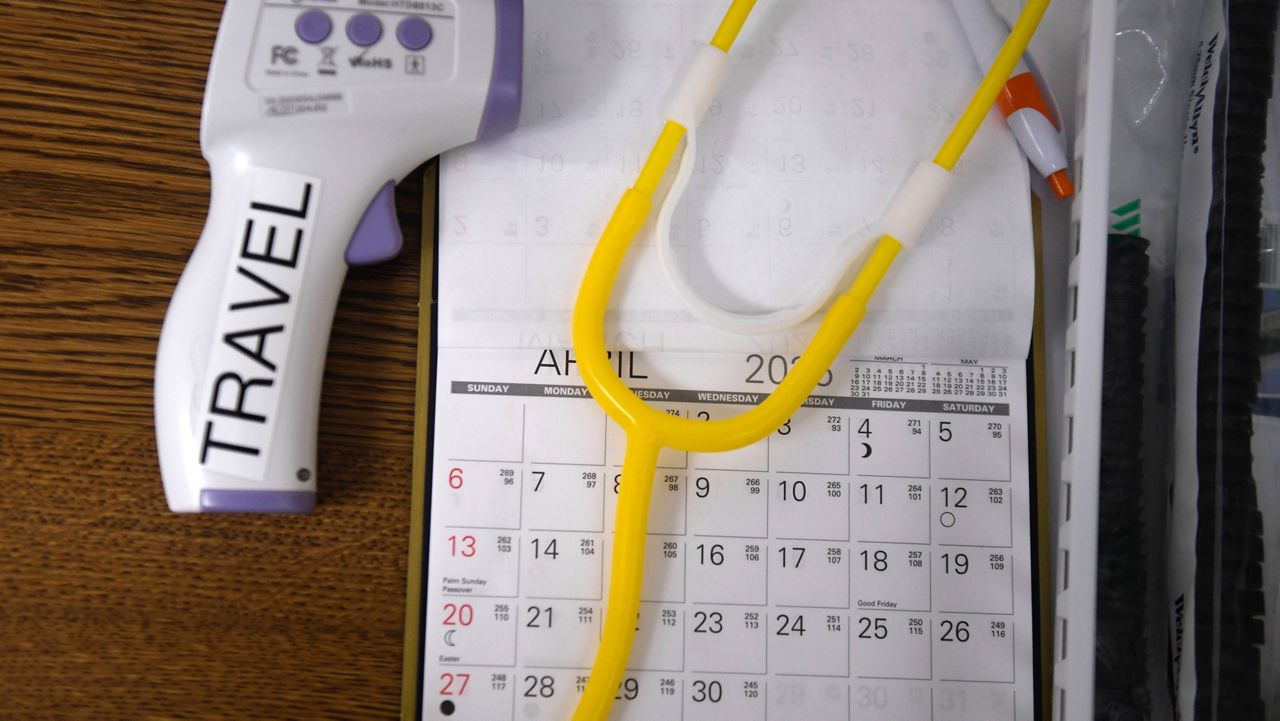RICHMOND COUNTY, N.C. — Many military families in North Carolina are hurdling barriers in health care for children on the autism spectrum.
What You Need To Know
- The Prancing Horse Therapeutic Horsemanship Farm is located in Hoffman, N.C.
- The program provides adaptive riding lessons to children on the autism spectrum
- Instructors walk students through each lesson
- The Martin family has benefited greatly since looking for more therapies after federal medical benefits were cut
James Martin lost some of his military medical benefits in 2021. The Department of Defense issued a notice to veterans on May 5, 2021 about what therapies would be covered under the updated Tricare Health model.
Applied Behavior Analysis, an interpersonal therapy used by ASD children in the past, would not be available for medical reimbursement from the federal government. Because of this adjustment in options, Martin enrolled his daughter, Mia, in a range of therapeutic treatments. From ABA to adaptive jujitsu to now therapeutic horseback riding, the Martins have weathered a storm of uncertainty.
“Since she started doing this, this is probably the No. 1 thing she enjoys the most. She looks forward to this every week,” Martin said.
Mia rides at Prancing Horse in Hoffman, more than one hour south of Raleigh.
Martin, a disabled combat veteran, said he feels confident his daughter’s growth can be tied to the structure of the horseback riding training.
“There’s something about her and the horse,” Martin said.“There’s something about her and the horse,” Martin said.
If Martin sounds like he is over-the-moon excited with his daughter’s progress, it's because he is.
Their family, like many other active-duty and retired service members, are used to the lack of therapeutic options available to children with autism. Mia, 13, was diagnosed as a non-verbal speaker with autism. Fast forward to the present, and she has demonstrated an ability to more clearly communicate her thoughts using words.
“I’ve noticed she is more talkative and interactive when she is out here around the horses,” Martin said.
To hear and see a parent’s joy, like James Martin, is why Patricia Watts took the reins as executive director of Prancing Horse in the summer of 2022.
“It’s just a really good feeling to help people. It’s a really calming environment. It’s great to be working with the horses. It’s great to see children and see them progress,” Watts said.
Watts has worked with Prancing Horse since 2018. The leader of the operation said she came on board after she responded to a newspaper advertisement about the farm.
The former corporate businesswoman said all rides and lessons are based on the needs of each family. “We have a really good time doing this,” Watts said.
The horses don’t get out of the barn without the help of some trained instructors.
Allison Wixson fell in love with the tall majestic animals long before she became an employee at the therapeutic horsemanship center.
“Hey, good girl,” Wixson said as she patted one of the horses, Lana, on the head. Wixson said horses are a great tool for development in humans because they, like many of their riders, sense body language and relay their thoughts without ever talking.
“Her body language is really how we tell the mood of the horse,” Wixson said. “If you are trying to pretend you are calm, but you are not inside, the horse will feel that energy and then sometimes our horses get a little tight or antsy.”
Such intuitive creatures won her heart before she could walk or talk. Time with horses is time well spent for Wixson.
“My mom put me on a horse when I was a baby and I cried when I got off, so from there I was hooked,” Wixson said.
To become an instructor at Prancing Horse, the person must first be certified by the Professional Association of Therapeutic Horsemanship International. PATH Intl. was formed in 1969 to set standards for equine-lead therapies and education. The formation of PATH Intl. has paved way for farms like Prancing Horse.
Every lesson can involve up to three riders and be a half-hour to one hour long. Participants are mainly paired with others with similar skills.
Wixson is one of four certified PATH Intl. instructors. Sessions are customized to the needs of the student.
“We adapt to them,” Wixson said.
Students like Mia have reaped therapeutic rewards. Her dad said her language skills, motor skills, cognitive abilities and ability to reign in her emotions are improving greatly.
“There’s just something that has this calming effect on my daughter,” Martin said.
Martin has been out of the U.S. Army for quite some time. The veteran served almost 18 years. He said he has been diagnosed with post-traumatic stress disorder and has faced a sometimes difficult return to civilian life. His time as a soldier resulted in multiple physical injuries from deployments to the Middle East.
His mission today is to ensure his daughter’s well-being, which includes enrolling her in multiple adaptive therapies.
The gains his daughter has made from the long hours spent in speech therapy have been amplified by the continued work in the saddle.
“Her verbal communication is definitely, definitely getting better,” Martin said.
Not only has Mia grown more comfortable with stringing together full sentences, but Wixson said she and other participants build muscle, too. Her 23-year-old licensed teacher said what can multiply progress is a parent’s participation in the courses.
“I love working with people with disabilities. I have an uncle who has Down syndrome. He kind of inspired this journey,” Wixson said.
The motivation provides a backdrop for why so many people at this farm sign up to do the work they do.
If a person stops by the farm during the spring or fall season, they will notice students maneuvering through a series of exercises in and out of the cattle ring in the same way they are learning to balance their external settings with their internal world.










